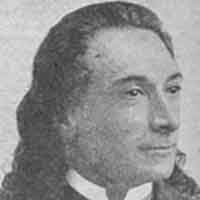A young man from Galicia, named Naphtali Herz Imber, inspired by the founding of Petah Tikvah in 1878, wrote a poem about his feelings. A farmer from Rishon LeZion heard the poem and enjoyed it so much that he promptly set it to music. The song, originally called “Tikvatenu” (Our Hope), later became “Hatikvah,” the national anthem of the State of Israel, lifting the spirits of Zionists around the world for over a century.
Naphtali Herz Imber was born in 1856 into a Hasidic family. He received a traditional education, and left home at an early age to wander around the world. He came to Palestine in 1882 and stayed for six years writing essays, poetry and articles for Hebrew periodicals.
Tikvatenu, one of Imber’s most popular poems, was first published in 1886, although it had initially been read in public as early as 1882 to a group of farmers in Rishon LeZion who received it enthusiastically. Among them was Samuel Cohen who was born in Moldavia. He decided to set the poem to a traditional Moldavian-Rumanian folksong called “Carul cu Boi” (Cart and Oxen).
During the 1880’s in Palestine, many tunes and adaptations became folksongs, no one thinking of copyrights. The “Tikvatenu” melody thus quickly became anonymous, and Imber’s association with it all but forgotten.
“Hatikvah” was sung at the conclusion of the Sixth Zionist Congress in Basle in 1903, the last congress presided over by Theodor Herzl, who died tragically the following year.The anthem was sung at all subsequent Zionist Congresses, and at the 18th Congress, held in Prague in 1933, it was officially confirmed as the Zionist anthem.
In 1892, the poet Imber settled in America, where he was married for a brief time. It was here that his second volume of poetry appeared in 1900 together with Talmudic literature translated into English. In spite of these intellectual achievements, however, he found it impossible to make a decent living in New York City, and in 1909, he died in poverty.
His poem lived on, becoming the unofficial anthem of Jewish Palestine under the British mandate. At the Declaration of the State of Israel on May 14, 1948, “Hatikvah” was sung by the assembly at its opening ceremony.
The words of “Hatikvah” have a timeless relevance for Jews everywhere, reinforced by both good and bad experiences – reinforced by wars and peace treaties alike. Naphtali Herz Imber’s words are as old as the Jewish people itself, yet they are also as young as the State of Israel, which took them to its heart.


12 thoughts on “Kaminos”
Was Nicholas related to Alexander Saslavsky who married Celeste Izolee Todd?
Anyone have a contact email for Yair Klinger or link to score for Ha-Bayta?
wish to have homeland concert video played on the big screen throughout North America.
can organize here in Santa Barbara California.
contacts for this needed and any ideas or suggestions welcomed.
Nat farber is my great grandpa 😊
Are there any movies or photos of max kletter? His wife’s sister was my stepmother, so I’m interested in seeing them and sharing them with his wife’s daughter.
The article says Sheb recorded his last song just 4 days before he died, but does not tell us the name of it. I be curious what it was. I’d like to hear it.
Would anyone happen to know where I can find a copy of the sheet music for a Gil Aldema Choral (SATB) arrangement for Naomi Shemer’s “Sheleg Al Iri”. (Snow on my Village)?
Joseph Smith
Kol Ram Community Choir, NYC
Shalom Joseph. I just saw your 2024 post by chance… I’m a mostly-retired Israeli journalist and translator. In 2003 I translated into English the content (the objective was to remain true to the meaning, not to cadence or rhyme) of poems and lyrics of 48 of Israel’s most iconic songs arranged by Aldema for choirs abroad singing in Hebrew (the words in the scores are transliterated) but members of the choir lack mastery of Hebrew to ‘know’ exactly what they are saying/singing… The book was titled in English “A Merry Choir” – in Hebrew מקהלה עליזה . See if you can find a copy in a used book store, it is priceless and apparently out-of-print – well worth the search. If not, they may have a copy at Tel Aviv Amenu Museum’s music department – write them and see if they can send it to you. Or – if you will contact me via Whatsapp – (972) 546872768 or via my email – I will try and find the book (it is not where it ‘should be’ so I have to search) and I will photograph the score with my cell and send to you as an attachment. Best, Daniella Ashkenazy – Kfar Warburg.
שלום שמעון!
לא שכחתי אותך. עזבתי את ישראל בפברואר 1998 כדי להביא את בני האוטיסט לקבל את העזרה המקצועית שלא הייתה קיימת אז בישראל. זה סיפור מאוד עצוב וטרגי, אבל אני הייתי היחיד עם ביצים שהביא אותו והייתי הורה יחיד בשבילו במשך חמישה חודשים. הוא היה אז בן 9. כעת הוא בן 36 ומתפקד באופן עצמאי. נתתי לו הזדמנות לעתיד נורמלי. בטח, אבות כולם חרא, אומרים הפמינציות, אבל כולם צריכים לעבוד כמטרות במטווחי רובה!
משה קונג
(Maurice King)
Thank you for this wonderful remembrance of Herman Zalis. My late father, Henry Wahrman, was one of his students. Note the correct spelling of his name for future reference. Thank you again for sharing this.
Tirza Wahrman (Mitlak)
amazing zchuso yagein aleinu, he wrote the famous niggun Lefichuch that is sung in almost every Israeli Yeshiva
My grandmother, Rose Ziperson, wrote the words to his music for a song called Main Shtetele, which he produced. I have the sheet music!